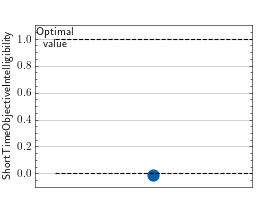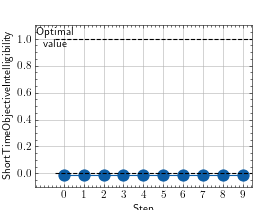Short-Time Objective Intelligibility (STOI)¶
Module Interface¶
- class torchmetrics.audio.stoi.ShortTimeObjectiveIntelligibility(fs, extended=False, **kwargs)[source]¶
Calculate STOI (Short-Time Objective Intelligibility) metric for evaluating speech signals.
Intelligibility measure which is highly correlated with the intelligibility of degraded speech signals, e.g., due to additive noise, single-/multi-channel noise reduction, binary masking and vocoded speech as in CI simulations. The STOI-measure is intrusive, i.e., a function of the clean and degraded speech signals. STOI may be a good alternative to the speech intelligibility index (SII) or the speech transmission index (STI), when you are interested in the effect of nonlinear processing to noisy speech, e.g., noise reduction, binary masking algorithms, on speech intelligibility. Description taken from Cees Taal’s website and for further details see STOI ref1 and STOI ref2.
This metric is a wrapper for the pystoi package. As the implementation backend implementation only supports calculations on CPU, all input will automatically be moved to CPU to perform the metric calculation before being moved back to the original device.
As input to forward and update the metric accepts the following input
preds(Tensor): float tensor with shape(...,time)target(Tensor): float tensor with shape(...,time)
As output of forward and compute the metric returns the following output
stoi(Tensor): float scalar tensor
Note
using this metrics requires you to have
pystoiinstall. Either install aspip install torchmetrics[audio]orpip install pystoi.- Parameters:
- Raises:
ModuleNotFoundError – If
pystoipackage is not installed
Example
>>> import torch >>> from torchmetrics.audio import ShortTimeObjectiveIntelligibility >>> g = torch.manual_seed(1) >>> preds = torch.randn(8000) >>> target = torch.randn(8000) >>> stoi = ShortTimeObjectiveIntelligibility(8000, False) >>> stoi(preds, target) tensor(-0.0100)
- plot(val=None, ax=None)[source]¶
Plot a single or multiple values from the metric.
- Parameters:
val¶ (
Union[Tensor,Sequence[Tensor],None]) – Either a single result from calling metric.forward or metric.compute or a list of these results. If no value is provided, will automatically call metric.compute and plot that result.ax¶ (
Optional[Axes]) – An matplotlib axis object. If provided will add plot to that axis
- Return type:
- Returns:
Figure and Axes object
- Raises:
ModuleNotFoundError – If matplotlib is not installed
>>> # Example plotting a single value >>> import torch >>> from torchmetrics.audio import ShortTimeObjectiveIntelligibility >>> g = torch.manual_seed(1) >>> preds = torch.randn(8000) >>> target = torch.randn(8000) >>> metric = ShortTimeObjectiveIntelligibility(8000, False) >>> metric.update(preds, target) >>> fig_, ax_ = metric.plot()

>>> # Example plotting multiple values >>> import torch >>> from torchmetrics.audio import ShortTimeObjectiveIntelligibility >>> metric = ShortTimeObjectiveIntelligibility(8000, False) >>> g = torch.manual_seed(1) >>> preds = torch.randn(8000) >>> target = torch.randn(8000) >>> values = [ ] >>> for _ in range(10): ... values.append(metric(preds, target)) >>> fig_, ax_ = metric.plot(values)

Functional Interface¶
- torchmetrics.functional.audio.stoi.short_time_objective_intelligibility(preds, target, fs, extended=False, keep_same_device=False)[source]¶
Calculate STOI (Short-Time Objective Intelligibility) metric for evaluating speech signals.
Intelligibility measure which is highly correlated with the intelligibility of degraded speech signals, e.g., due to additive noise, single-/multi-channel noise reduction, binary masking and vocoded speech as in CI simulations. The STOI-measure is intrusive, i.e., a function of the clean and degraded speech signals. STOI may be a good alternative to the speech intelligibility index (SII) or the speech transmission index (STI), when you are interested in the effect of nonlinear processing to noisy speech, e.g., noise reduction, binary masking algorithms, on speech intelligibility. Description taken from Cees Taal’s website and for further details see STOI ref1 and STOI ref2.
This metric is a wrapper for the pystoi package. As the implementation backend implementation only supports calculations on CPU, all input will automatically be moved to CPU to perform the metric calculation before being moved back to the original device.
Note
using this metrics requires you to have
pystoiinstall. Either install aspip install torchmetrics[audio]orpip install pystoi- Parameters:
- Return type:
- Returns:
stoi value of shape […]
- Raises:
ModuleNotFoundError – If
pystoipackage is not installedRuntimeError – If
predsandtargetdoes not have the same shape
Example
>>> import torch >>> from torchmetrics.functional.audio.stoi import short_time_objective_intelligibility >>> g = torch.manual_seed(1) >>> preds = torch.randn(8000) >>> target = torch.randn(8000) >>> short_time_objective_intelligibility(preds, target, 8000).float() tensor(-0.0100)
